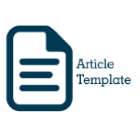LANGUAGE SUPPORT STRATEGIES AND HIGHER EDUCATION TEACHING MANAGEMENT
Abstract
This paper delves into the intricate relationship between language support strategies and higher education teaching management, with a focus on the academic achievements and overall development of second language (L2) learners. As the world becomes increasingly interconnected and multicultural, the role of universities in fostering the academic success of L2 learners has gained paramount importance. This research strives to contribute to the existing body of knowledge by examining the multifaceted dynamics of language support, pedagogical methodologies, and institutional management strategies within the context of higher education. The study commences by delving into the theoretical underpinnings of second language acquisition(SLA) and its impact on academic performance. Drawing upon prominent linguistic theories and psychological frameworks, the research establishes a foundation for comprehending the cognitive, socio-cultural, and linguistic aspects that influence L2 learners’ educational journey. Moreover, the paper investigates the challenges faced by L2 learners in higher education settings, ranging from linguistic barriers to socio-psychological factors, and underscores the significance of tailored language support interventions. Central to this study are the diverse language support strategies employed by higher education institutions to facilitate the integration and progression of L2 learners. The investigation encompasses an array of pedagogical approaches, including content-based instruction, language-specific courses, technology-enhanced learning, and peer-assisted support systems. By critically evaluating the effectiveness of these strategies, the paper identifies best practices that resonate with L2 learners’ needs and contribute to their academic excellence. Furthermore, the research explores the intricate interplay between language support strategies and the broader framework of higher education teaching management. It delves into how institutional policies, curriculum design, faculty training, and administrative structures intersect with language support initiatives to shape the holistic development of L2 learners.
By analyzing case studies from diverse universities, the paper sheds light on how successful integration of language support within teaching management enhances students’ academic engagement, fosters a positive learning environment, and cultivates cross-cultural competence. In conclusion, this paper underscores the pivotal role of language support strategies in shaping the academic success and personal growth of second language learners in higher education. By offering a nuanced perspective on the symbiotic relationship between language support and teaching management, the study extends practical implications for universities aiming to enhance their L2 learners experiences. Ultimately, this research advocates for a student-centered approach that amalgamates language support, pedagogical innovation, and administrative synergy to foster an inclusive and thriving academic community.
Full Text:
PDFReferences
Arkoudis, S; Tran, Ly (2010). Writing blah, blah, blah: Lecturers’ Approaches and Challenges in Supporting International Students. Deakin University. Journal contribution.
Benzie, H. J. (2010). Graduating as a “native speaker”: International Students and English Language Proficiency In Higher Education. Higher Education Research and Development, 29(4), 447–459.
Bista, K. (2015). Supporting international students’ academic success and retention. Routledge.
Carroll, M., & Ryan, J. (Eds.) (2005). Teaching International Students: Improving Learning for All. Routledge.
Cheng, L., Watanabe, Y., & Curtis, A. (Eds.) (2016). Language Assessment in Higher Education. Springer.
Flowerdew, J., & Peacock, M. (Eds.) (2021). Research Perspectives On English for Academic Purposes. Cambridge University Press.
Hellekjaer, G. O., & Bjørke, G (2018). Supporting Second Language Students In Higher Education: A Systematic Review Of The Literature. Studies in Higher Education, 43(7), 1262-1281.
Hsieh, Y. H., & Urrieta, L (2018). Language support for English language learners in higher education: A systematic review of the literature. Journal of Diversity in Higher Education, 11(2), 137-152.
Hyland, K., & Shaw, P. (Eds.) (2016). The Routledge handbook of English for academic purposes. Routledge.
Li, Y. Y., Flowerdew, J., & Cargill, M(2018). Teaching English for Research Publication Purposes to Science Students in China: A Case Study of an Experienced Teacher in the Classroom. Journal of English for Academic Purposes, 35, 116-129.
Neumann, H., & Kopiez, R(2021). Language support for international students in higher education: A systematic review of the literature. Studies in Higher Education, 46(7), 1362-1381.
Wilkinson, R., & Walsh, L. (Eds.) (2018), Integrating content and language in higher education: Perspectives on professional practice. Routledge.
Refbacks
- There are currently no refbacks.
This is an Open Access article distributed under the terms of the Creative Commons Attribution-NonCommercial-NoDerivatives 4.0 International (CC BY-NC-ND 4.0), permitting copy and redistribute the material in any medium or format.





